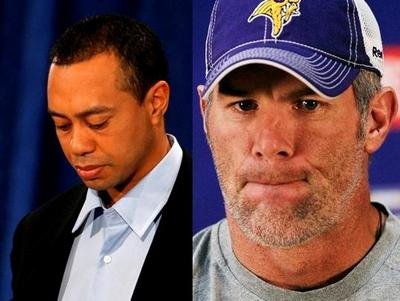A large chunk of my life has been spent traveling with professional athletes, their co-workers, trainers, coaches, executives, etc.
If you pulled my fingernails with a pliers I could tell you stories about the behavior of professional athletes that would make sexting a sideline reporter or propositioning a couple of massage girls seem like forgetting to say "please" and "thank you."
I'm not naming names here, but I will say that I've seen a man regarded by many as the greatest ever to play his sport -- a married man, mind you -- bend the arm of someone from the team to arrange a visit from a "pretty young thing" during a stopover at a hotel ... and the other guy delivered.
I bring this up because of all the column inches being used of late to discuss the Brett Favre thing in specific and the concept of morality in sports in general. The article that really got me going was a blog by Andy Tarnoff last week. For those who don't know, Tarnoff is the guy who hired me at OnMilwaukee.com, and my boss. Some of you probably hope this is my suicide column.
The idea of his column was whether morality matters in sports. He decided that the answer was obviously no. My answer is clearly yes.
If you've got a narrow definition of morality then Andy is probably right. If you define moral behavior by things you do not do: you don't drink and drive; you don't use drugs; you don't chase after underage girls; you don't chase after any girls if you are married. If you do those things, of course it is immoral behavior.
But think about sports as a whole.
At almost all levels, from peewee's up to the pros, almost all athletes and coaches play by the rules of their sport. The tales of cheating in sports are almost nonexistent. I guess I might say that playing by the rules, telling the truth if you will, may be one of the highest acts of moral behavior there is. It's something that every kid ought to learn.
Sports are rough. The hits are hard and people get injured. But none of that hitting is ever a surprise. Everyone knows what to expect when they step on the field. Fans know, too. The affront to our moral standards sometimes comes when it is a surprise. Tiger Woods was an affront, partly because of what he did but also because of the surprising nature of the offense.
But even the roughness of sport allows for lessons in moral kinds of behavior. Holding out your hand to help an opponent to his feet. Patting a guy on the butt after a great play. Congratulating the winning team and consoling the losing team. This kind behavior is something we should all tell our kids about and they can learn a real lesson from it.
If you are looking for a blanket indictment for immoral behavior, I'd suggest looking at the world of politics. From the little city councils to the halls of Congress, the world is alive with cheating, lying, scamming and bullying. That's immoral behavior throughout the fabric.
But in sports, the individual offense to our standards and beliefs is, thankfully, still the exception. For every Tiger or Brett there are 10 athletes visiting sick children in hospitals or reading to a class of second graders.
And it's important to remember that the Tiger's and Brett's of the world of sports behaved immorally outside the activities of their sport. The immorality goes more to the character of the individual than to the sport in which they participate. In the world of politics the immoralities are endemic in the institution.
I'd also suggest that while politicians can generally escape punishment for immoral behavior athletes are almost always sanctioned for behavior that runs counter to our moral code. Look at Pete Rose, Tiger and his sponsors and the countless athletes who have failed drug tests. Sports police do a pretty good job. Not perfect. But they aren't sitting on their hands, either.
You would have a hard time saying sports are immoral while saying politics is immoral is much, much easier and much closer to the truth.
So when you ask the question of whether morality matters in the world of sports, I think the answer is clearly in the affirmative and anyone who thinks otherwise needs to expand their view of what's moral and what's not.
With a history in Milwaukee stretching back decades, Dave tries to bring a unique perspective to his writing, whether it's sports, politics, theater or any other issue.
He's seen Milwaukee grow, suffer pangs of growth, strive for success and has been involved in many efforts to both shape and re-shape the city. He's a happy man, now that he's quit playing golf, and enjoys music, his children and grandchildren and the myriad of sports in this state. He loves great food and hates bullies and people who think they are smarter than everyone else.
This whole Internet thing continues to baffle him, but he's willing to play the game as long as OnMilwaukee.com keeps lending him a helping hand. He is constantly amazed that just a few dedicated people can provide so much news and information to a hungry public.
Despite some opinions to the contrary, Dave likes most stuff. But he is a skeptic who constantly wonders about the world around him. So many questions, so few answers.





